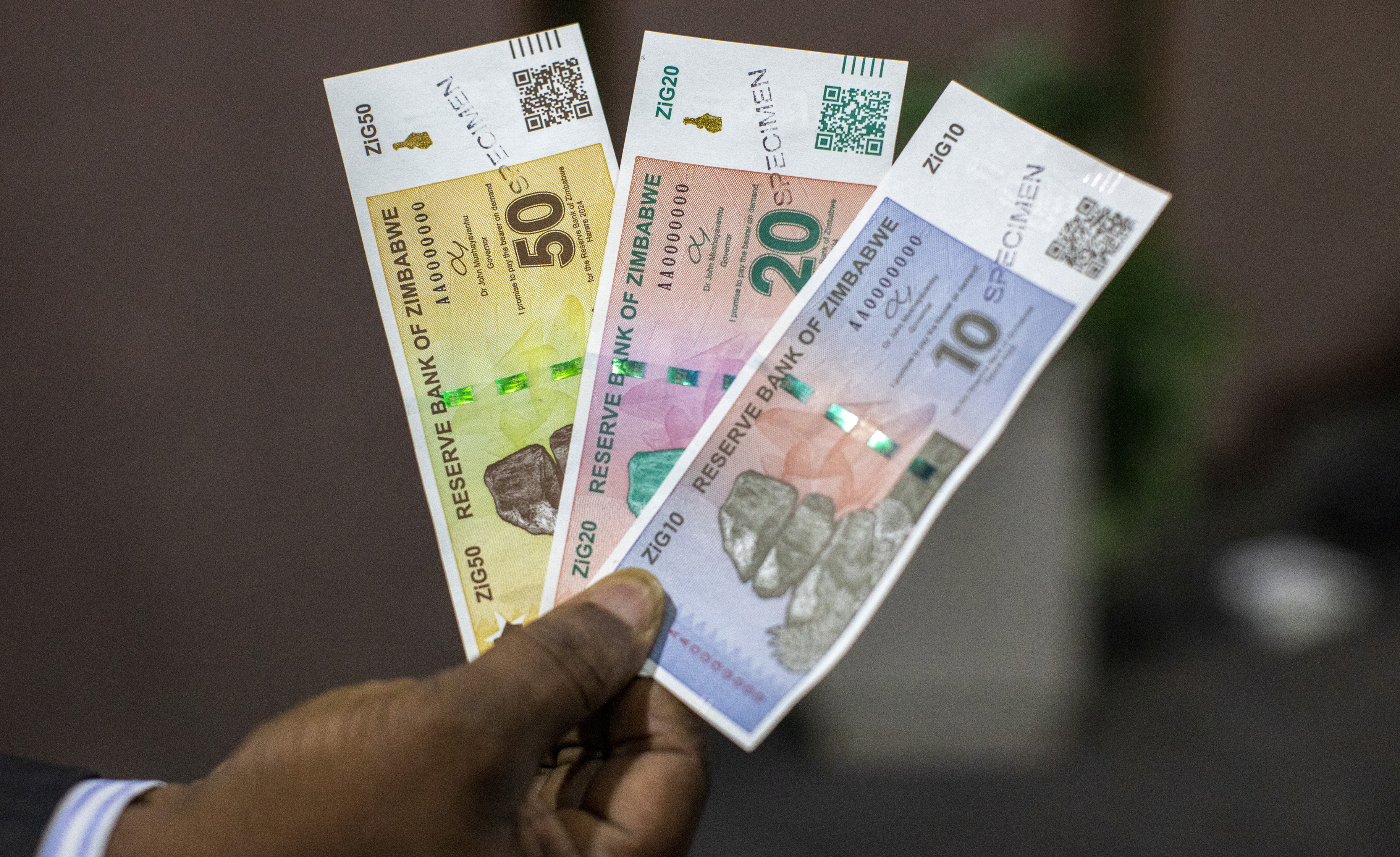Fewer than five months after it was introduced, the Reserve Bank of Zimbabwe announced a devaluation of the ZiG (Zimbabwe Gold). The official devaluation on 27 September came a few weeks after the government started pushing for de-dollarisation.
The reserve bank said the devaluation was in response to a “resurgence in exchange rate pressures”, which manifested in “the widening parallel market exchange rate premium and the increase in inflationary pressures”.
While the ZiG has been devalued to about $1:25, it is still playing catch-up with the parallel market, which is hovering around $1:32. The latter is closer to renowned global inflation monitor Professor Steve Hanke’s estimate of 67% devaluation of the ZiG since its introduction.
The move puts ordinary citizens and businesses in a bind, and not for the first time. To the average civil servant who was paid the previous week, the announcement meant the ZiG component of their salaries lost 42.5% of its value – a major reduction in purchasing power. The constant erosion of wages has led to widespread dissatisfaction among public sector workers and further distrust in the economic and monetary policies that impoverish them.
Zimbabweans are accustomed to the vagaries of currency fluctuations. Over the past two decades the value of citizens’ savings, pensions and insurance have been effectively wiped out, and their earnings whittled away. Respective Zimbabwe African National Union-Patriotic Front (Zanu-PF) administrations appear oblivious to this impact on ordinary people, and government assurances that the currency will stabilise lack credibility.
Business and private-sector players have not been spared. Companies such as large retail shops and manufacturing firms are also burdened by currency instability and short-term reactive policy measures.
Government controls and reserve shortages severely restrict access to foreign currency on the formal market. The formal allocation process, the auction system and the interbank forex market are flawed and reflect a pegged exchange rate that doesn’t allow price discovery.
The reserve bank auction system has a nearly $100-million backlog. At the same time, the interbank system fails to provide sufficient forex on demand. This makes it difficult for businesses that must apply for forex weekly on auction to plan, price goods or invest in long-term growth.
The informal sector – which operates almost exclusively in US dollars and is estimated to be 64% of Zimbabwe’s economy – has been a weathervane of the local currency’s credibility. It has the advantage of operating on a cash basis, escaping regulatory sanctioning and the formal banking system.
The black-market exchange rate often trades at double or even triple the official value for price discovery on an open market. This parallel market has become the government’s go-to scapegoat to explain the ZiG’s lack of traction, even though the parallel market is largely a reaction to currency manipulations and distortions by the monetary authorities.
The distortions further point to persistent foreign currency shortages in the formal market. The reserve bank has been accused of manipulating forex by controlling access to foreign currency at the official rate, leaving businesses and citizens with no choice but to turn to the parallel market.
The ZiG’s introduction was greeted with a mix of cautious optimism and scepticism from citizens expecting a similar outcome to the previous five attempts at introducing a domestic currency. A local currency would be preferable, but many analysts question the government’s knee-jerk reactions and lack of transparency and consultations. The history of Zimbabwe’s failed currency and troubled economy is well documented, yet the government continues to make counterproductive decisions.
Since the Zimbabwe dollar’s collapse in 2008, attempts by the monetary authorities and Ministry of Finance to stabilise the currency and support the ZiG have been largely ineffective. Several factors are to blame, including the ad hoc reactionary approach, fiscal imprudence, inconsistency in policy application and misalignment of policies with market realities.
While the government said the new currency would be backed by gold reserves, the official devaluation and food inflation since August tell a different story. It’s now clear that the ZiG was not backed by gold and that Zimbabwe has insufficient reserves to back the currency. Such a mismatch between the government’s position and reality does little to engender trust.
Currency instability is likely to make resolving the country’s external debt difficult. The African Development Bank-facilitated High-Level Debt Resolution Forum for dealing with Zimbabwe’s external debt crisis has three pillars. Comprehensive economic reforms by the government is one of them.
Managing currency stability is a core part of these reforms, but the government lacks commitment to fiscal discipline, transparent monetary policy and actions to militate against runaway inflation. Higher spending on infrastructure increases the amount of local currency in circulation, which defeats efforts at currency stabilisation. Zimbabwe’s unsustainable debt stands at 96.7% of gross domestic product.
The currency crisis reflects a deeper governance and ideological crisis. The Zanu-PF government has opted for politically expedient decisions at the expense of ensuring macroeconomic stability, which requires actively building confidence. This resonates with its overall approach to governance – characterised by short-term fixes, propaganda and threats.
Zimbabwe’s biggest challenge is that the government is not invested in building a trusting relationship with citizens. Over the past two decades, citizens’ experiences have created a crisis of confidence in the government that is impossible to resolve without significant political and economic reform.
Rather than papering over the cracks, Zimbabwe needs a coherent, credible economic strategy. The painstaking task of restructuring the political economy, building public and business confidence, and long-term strategic thinking will be the Mnangagwa administration’s main challenge in the next four years.
Without a consistent economic strategy, Zimbabwe will remain trapped in perpetual crisis, with ordinary citizens bearing the brunt of the government’s failures as the ZiG faces the same fate as previous local currency experiments. DM
Ringisai Chikohomero, Researcher, southern Africa, Institute for Security Studies (ISS) Pretoria.
First published by ISS Today.




